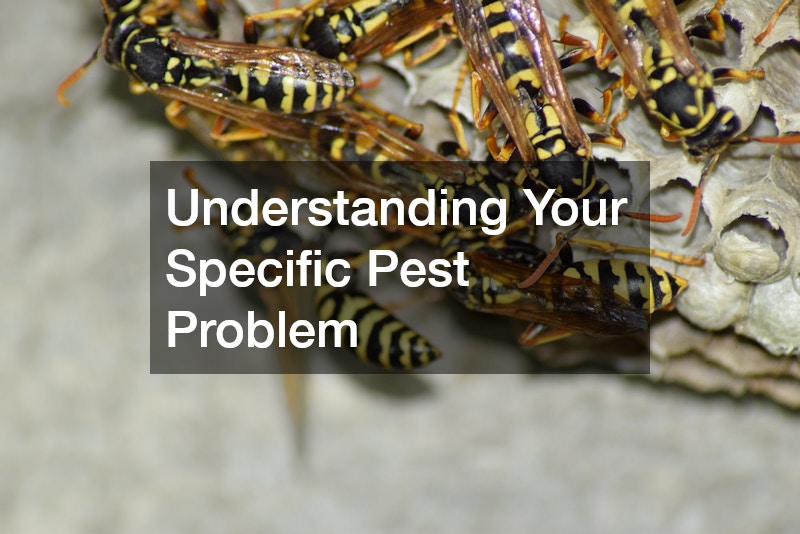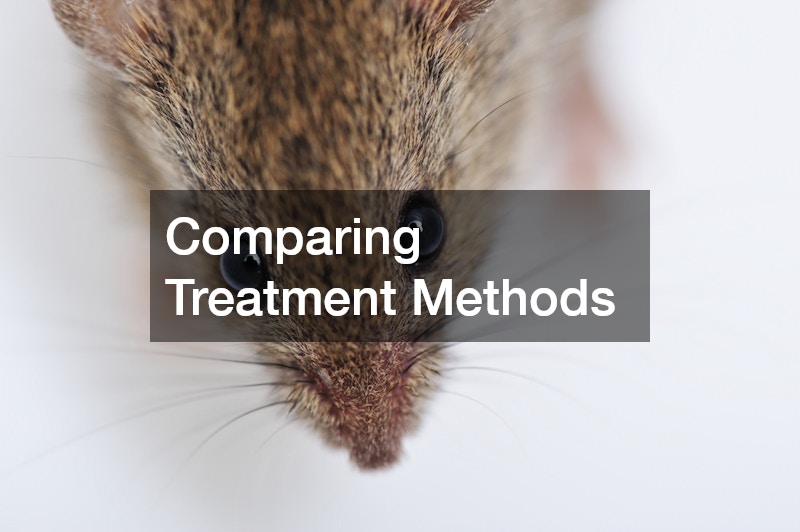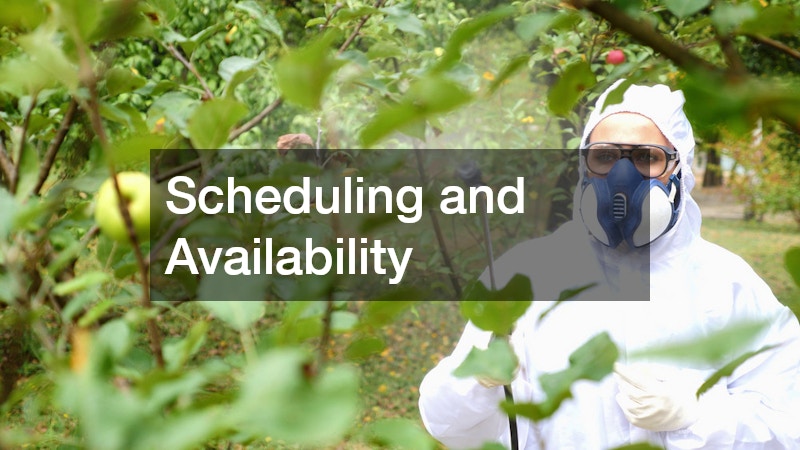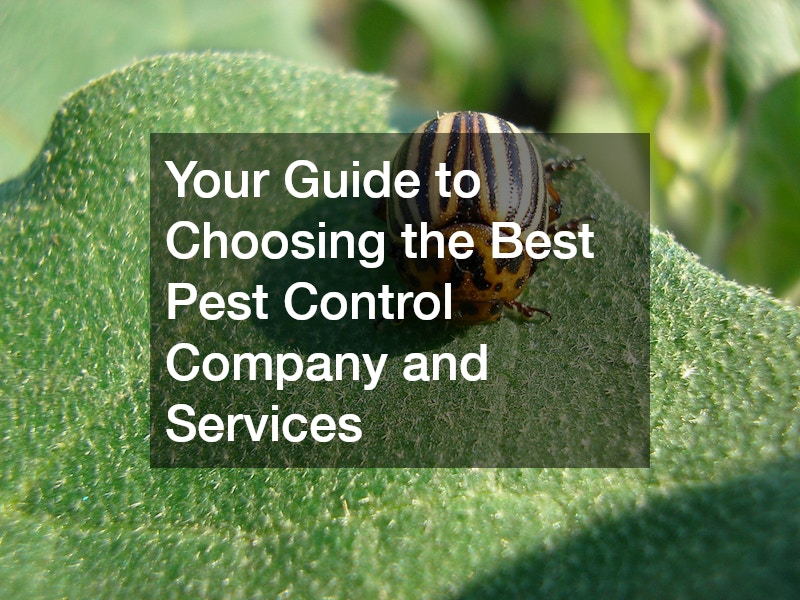Pests are more than just a nuisance—if left unchecked, they can pose serious health risks, damage your property, and create an ongoing source of stress. Whether you’re dealing with ants in the kitchen, rodents in the basement, or wasps on the porch, finding the right professional to handle the problem is essential. This guide to choosing the best pest control company will help you navigate the process from start to finish, ensuring you get effective, reliable, and safe solutions.
Not all pest control companies operate with the same level of expertise or integrity. Some specialize in handling specific pests, while others offer a wide range of services that can address multiple concerns at once. Companies with broader home improvement expertise can sometimes provide additional property maintenance services—such as siding repair, seamless gutter installation, roof inspection, and even retaining walls.
One key advantage of using a guide to choosing the best pest control company is avoiding costly mistakes. Choosing the wrong exterminator can result in ineffective treatments, unnecessary expenses, and recurring infestations. This is why research and comparison are essential before committing to a contract. Additionally, pest control often overlaps with home maintenance. For example, wildlife removal may require repairing attic insulation to prevent re-entry, while eliminating mosquito breeding grounds could involve tree removal or gutter cleaning. A comprehensive approach ensures your pest problem isn’t just treated, but prevented from returning.
Understanding Your Specific Pest Problem

Before you can choose the right company, you need to understand what you’re up against. This step is critical in a guide to choosing the best pest control company because different pests require different approaches. A general exterminator may be sufficient for ants, cockroaches, or spiders, but more specialized infestations—like termites, ticks, or bed bugs—often call for targeted expertise.
You should also consider whether your pest problem is seasonal or ongoing. For instance, tick control services may be most needed in warmer months, while rodent invasions are more common in winter. A good pest control provider will conduct an inspection and accurately identify the type and severity of the issue, saving you both time and money.
Understanding the patterns of pest activity around your property is equally important. Certain environmental factors, such as proximity to wooded areas, the condition of your siding, or the presence of retaining walls, can influence the likelihood of infestations. Identifying these factors can help you choose a provider that offers both treatment and prevention strategies tailored to your home’s unique risks.
Moreover, the right exterminator won’t just address the immediate problem but will also offer insight into long-term prevention. For example, they may recommend sealing entry points, trimming overgrown landscaping, or installing seamless gutter systems to keep pests at bay.
Checking Credentials and Licensing
When evaluating potential providers, licensing should be a non-negotiable requirement. This is one of the most important points in any guide to choosing the best pest control company because it guarantees that the business meets your state’s legal standards. Licensed exterminators have undergone proper training, ensuring they use pesticides and other treatments safely and effectively.
Ask each company for proof of licensing and certifications. In many states, pest control companies must also be bonded and insured to protect you in case of accidents or damages. Insurance becomes even more important if the provider offers additional services like wildlife removal, roof maintenance, or tree removal, where the risk of property damage can be higher.
Beyond licensing, look for memberships in professional organizations, such as the National Pest Management Association. These affiliations often require adherence to higher ethical and performance standards, which is another layer of protection for homeowners.
Finally, check whether the company’s staff undergoes continuing education. Pest control methods evolve, and ongoing training ensures your exterminator is equipped with the latest tools and techniques—especially for challenging problems like tick control services or attic insulation repairs related to pest prevention.
Reviewing Service Specialties
Not every company handles all types of pests or property-related concerns. As part of your guide to choosing the best pest control company, you should look for a provider whose specialties align with your needs. For example, if you need tick control services, make sure the company advertises this as part of its offerings.
Some providers also expand their work to include related home services that help prevent future infestations. These may include the expertise of an attic insulation contractor to seal gaps, siding repairs to block entry points, or seamless gutter cleaning to eliminate standing water where mosquitoes breed.
Service specialties can also extend to structural work that supports pest prevention, such as repairing retaining walls or improving roof ventilation to deter wildlife nesting. Choosing a company with this breadth of skills can save you the trouble of hiring multiple contractors.
Furthermore, if your pest issues are linked to environmental features—like trees close to your home or poor drainage—selecting a provider that also offers tree removal or grading services can address the root cause of the problem in one comprehensive package.
Comparing Treatment Methods

When choosing an exterminator, ask about the specific treatment options available. A responsible pest control provider will explain the process, potential side effects, and any precautions you should take before and after service.
Modern approaches may include eco-friendly or low-toxicity solutions, heat treatments, or targeted baiting systems. For outdoor pests, such as ticks or mosquitoes, you may find services that integrate landscaping advice—such as trimming bushes, maintaining retaining walls, and ensuring proper drainage—to keep pests away naturally.
Some providers specialize in integrated pest management (IPM), which focuses on minimizing chemical use by combining biological, cultural, and mechanical controls. This can be especially useful for families with children, pets, or gardens they want to protect.
Other companies might recommend structural adjustments—such as sealing roof gaps, improving siding condition, or installing seamless gutter systems—to reduce pest entry points and breeding grounds. The more varied and adaptable the methods, the better the long-term results will be.
Reading Reviews and Getting References
Customer feedback can be invaluable when searching for a trustworthy exterminator. Online reviews, testimonials, and word-of-mouth recommendations can reveal whether a company consistently delivers results.
As part of your guide to choosing the best pest control company, focus on patterns rather than isolated comments. A provider with mostly positive reviews and repeat customers is a safer choice. Don’t hesitate to ask for references you can contact directly. Speaking with past clients can give you insight into the company’s professionalism, punctuality, and effectiveness in resolving pest issues.
Reading detailed reviews can also help you understand how a provider handles complications. For example, if a roof repair was needed during wildlife removal, did the company handle it smoothly? Did they follow up after tree removal to ensure pests didn’t return? These are important indicators of quality service.
In addition, checking social media profiles and local community boards can give you a real-world perspective. Many homeowners post before-and-after photos of their pest control projects, which can help you gauge a company’s thoroughness and attention to detail.
Considering Long-Term Prevention Plans
Eliminating pests is only part of the battle. Many homeowners prefer ongoing service agreements that include regular inspections and treatments. This is an essential part of your guide to choosing the best pest control company because prevention often costs less than emergency intervention.
A comprehensive plan may combine regular tick control services with seasonal checks, attic insulation upgrades, siding maintenance, and seamless gutter cleaning. These measures address both the symptoms and root causes of infestations.
Some providers may also offer habitat modification, such as improving drainage near retaining walls or pruning overhanging tree branches that give pests easier access to your roof. Such improvements can drastically reduce the likelihood of future infestations. By bundling pest control with preventive home maintenance—like wildlife removal inspections and tree removal when necessary—you ensure a more complete, long-lasting solution that protects your investment.
Comparing Costs and Value

Price is important, but it should never be your sole deciding factor. In your guide to choosing the best pest control company, value is defined as the balance between cost, quality, and long-term results.
Obtain multiple quotes from different exterminators, making sure each includes the same services for a fair comparison. Be cautious of unusually low bids, which could mean lower-quality treatments or hidden fees later on.
Look beyond the initial price and consider added benefits. For example, a company that includes free follow-up visits, offers wildlife removal services, or inspects your roof and siding as part of a pest control plan may be worth a higher rate.
Finally, consider the financial advantages of prevention. Investing in seamless gutter installation or tree removal might seem unrelated at first, but these services can drastically reduce pest risks and save you costly treatments in the future.
Looking for Eco-Friendly Solutions
Many homeowners are now prioritizing environmentally friendly pest control methods. If sustainability is important to you, include this consideration in your guide to choosing the best pest control company.
Eco-friendly approaches might use plant-based sprays, mechanical traps, or biological controls that target pests without harming beneficial species. Some providers integrate landscaping modifications—like adjusting retaining walls for better drainage or adding seamless gutter systems to reduce water accumulation—to deter pests naturally.
Choosing an eco-friendly exterminator can also protect your home’s long-term health. Harsh chemicals may solve one problem but create others by damaging siding, roof materials, or even soil quality around your home.
By opting for a provider who balances effectiveness with environmental responsibility, you ensure a healthier space for your family and reduce your home’s ecological footprint.
Understanding Warranty and Service Guarantees
A reputable pest control provider should stand by its work. When choosing the best pest control company, always ask about warranties and service guarantees. These commitments show that the company is confident in its ability to deliver lasting results. A guarantee might mean free follow-up visits if pests return within a certain timeframe. For more comprehensive services—such as wildlife removal, roof sealing, or siding replacement—warranties on materials and labor can provide added peace of mind.
Some companies even offer extended guarantees for clients who sign up for ongoing prevention plans. This could include regular inspections of attic insulation, seamless gutter cleaning, and tree removal if necessary. The clearer the guarantee terms, the easier it’s to hold a company accountable and ensure your investment pays off.
Scheduling and Availability

Pest problems often require quick action, so availability is a practical factor to consider. In this guide to choosing the best pest control company, we emphasize choosing a provider who can respond promptly to urgent situations. Some exterminators offer same-day or next-day appointments, while others may require a longer wait. If you have an immediate issue—like a wasp nest near your roof or a raccoon in your attic—timely service is crucial.
In addition, seasonal treatments—such as tick control services or wildlife removal inspections—should be scheduled at the optimal time for effectiveness. A provider that proactively manages your appointment schedule can help you stay ahead of potential infestations. Companies that offer flexible scheduling, including evenings or weekends, may be especially valuable for busy households.
Selecting the right professional to handle your pest issues is about more than eliminating unwanted critters—it’s about protecting your home, health, and investment. This guide to choosing the best pest control company has guided you through understanding your pest problem, verifying credentials, comparing specialties, and considering treatment options that align with your needs and values.
From hiring an exterminator for immediate issues to working with an attic insulation contractor or siding repair specialist for long-term prevention, your decision should be guided by thorough research and a clear understanding of the services offered. A good provider will address the root cause of infestations, not just the symptoms, ensuring your home remains safe and pest-free.
By integrating pest control with other property services—such as tree removal, roof inspections, seamless gutter cleaning, and retaining wall maintenance—you can create a robust prevention strategy. These steps, combined with warranties and strong customer service, give you confidence in your investment. Whether you’re dealing with ticks, rodents, or larger wildlife removal needs, the right company can deliver tailored solutions backed by warranties, transparent pricing, and responsive service. By following this guide to choosing the best pest control company, you can confidently select a provider that offers effective treatments, preventive care, and peace of mind for years to come.
